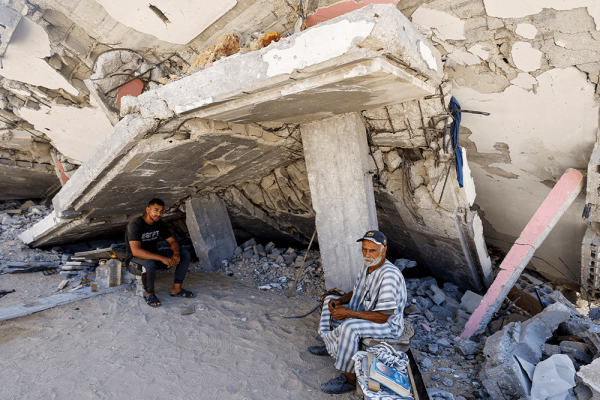A callous, calculating cycle of lethal violence grips the Middle East. Its momentum seems unstoppable and could engulf nations beyond the region into warring conflict, with nuclear weapons — unused in any war for 79 years — on hair triggers. Historians will dissect the complex web of events over the past century that brought us to this precipice in the Middle East. But in the U.S., particularly within the life and witness of its churches, our attitudes and actions have been afflicted with an asymmetry of empathy.
The present political and religious environment is both intense and toxic, making any judgements about Israel and Palestine perilous. Anyone who dares speak is immediately subject to interrogation, often followed by indictments of antisemitism, or religious zealotry, or blind ideological bias. It’s hard to articulate a message that cuts beneath entrenched, polarized rhetoric — and even harder to listen. But we must try to speak, for silence is complicit resignation to evil, terror, and calamity.
The establishment of the state of Israel was seen as the means to ensure and protect the survival of the Jewish people in the wake of the Holocaust, modern history’s monstrous genocide. Global empathy, mingled with geopolitical agendas, empowered this historic initiative. In the process, Palestinians and others were uprooted and displaced; with their stories mostly unheard, a deficit of empathy ensued. American churches were absorbed by biblical interpretations of eschatology, which had the effect of reducing God to a real estate agent.
Attempts to find political solutions that gave expression to Palestinian sovereignty alongside assurances of Israeli security repeatedly failed. Since 1967, an occupation of captured lands by Israel, judged illegal by the international community, has persisted, with half a million settlers encamped in protective, secure enclaves enshrining separate and unequal daily realities for Palestinians.
Hamas’ brutal attack on Oct. 7, 2023 left more than 1,100 people dead and 251 taken hostage; the carnage delivered a traumatic blow to Israel’s corporate belief in its geographical and psychological security. The faces of Israeli victims on billboards and TV screens pierced compassionate hearts. Israel’s resulting attack on Gaza shattered all the boundaries of humanitarian and legal restraint in war. Among the 41,870 people who have been killed, a majority have been women and children — including 16,750 children. Around 1.9 million Gazans, 90 percent of the population, have been displaced, some multiple times. An estimated 66 percent of Gaza’s buildings are destroyed, including 277,000 homes, plus many schools and hospitals. But we only get glimpses of these facts and human faces. Independent journalists are prohibited by Israel from entering Gaza, and at least 128 journalists within Gaza have been killed. It’s hard to have empathy for statistics.
Around 60,000 Israelis have fled from their homes in northern Israel since Hezbollah’s shelling started on Oct. 8, 2023. Their plea to return is a domestic motive for Israel’s military campaign to eliminate Hezbollah’s presence north of the border. Further attacks aim to decimate Hezbollah’s leadership and Iranian-supplied arsenals. But we hear almost nothing of the 95,000 Lebanese who fled their nation’s border region, and the 1.2 million of its citizens now leaving their homes, desperate to escape the mostly U.S.-supplied bombs Israel has dropped from planes, drones, and missiles. More than 2,000 people have perished amid the rubble that also has buried several of Hezbollah’s leaders.
Largely unnoticed, Israel’s settlers on the West Bank have unleashed their own assaults on Palestinian neighbors while Israeli security forces have killed more than 700 people there — people who are almost always labeled “militants.” Israel’s government, rejecting any version of a political settlement that includes a meaningful expression of Palestinian sovereignty, now seems intent on destroying the leadership and infrastructure of all factions it sees as its enemies, regardless of civilian devastation and international condemnation. This further radicalizes a rising generation of Palestinians.
In response, Iran chose a “show of strength,” firing at least 180 missiles at Israel to defend its image and support for Hezbollah, Hamas, and its “axis of resistance,” inviting certain retaliation that risks U.S. involvement and that of Iran’s global allies. So here we are, at this precipice.
What can religious voices rooted in a commitment to God’s justice and peace say in this perilous moment? The answer, I believe, lies in the themes of biblical wisdom, which we know to be true in any time and in any context.
It is a deadly folly to believe, as some assert, that escalation is the path to de-escalation. The truth is that violence begets violence. In Jesus’ command to love your enemies, we see that peace is not just a desired outcome; peacemaking reflects God’s means to move toward the desired end. This present cycle of retaliatory, vengeful violence from all sides must cease — and cease now. An unconditional cease-fire by all parties on all fronts — including the languishing “deal” promising the hostage return by Hamas — is the precondition to prevent calamity. Let us stop the insanity of believing that this lethal cycle of violence can be broken by more violence.
Any biblically rooted witness declares again, with prophetic clarity and anger, that human lives must never be treated as disposable commodities, “tragic but necessary” casualties, or vulnerable human shields. Every person holds an inherent dignity and sanctity that derives from the imprint of God’s image at their core, which can be viciously violated but can never be erased by human action. The massive desecration of the sanctity of human life in Gaza, the West Bank, Lebanon, and Israel today violates God’s image and intention in divine law and is manifestly criminal in international law.
We also know God’s compassion knows no boundaries, breaking through barriers of nationalisms, ethnicities, ideologies, and parochial narratives that constrain our empathy. Therefore, any biblically inspired hope of a diplomatically brokered end to military violence — and a space to imagine a political solution — must be grounded in an inclusive empathy that finds room to absorb the suffering of all.
Within this inclusive empathy, we also see that God’s intended future always brings to the center those oppressed and suffering at the margins of any society — an all-encompassing love that always amplifies the voices of those who have been silenced or overlooked. Hearing these voices is essential. There’s a principle here: Pain must be named if it is to provide a pathway to healing and transformation. And pain that is not acknowledged will be transmitted. For decades, asymmetrical empathy has fueled an endless, reciprocal transmission of suffering and violence.
God’s love, shown in the life, death, and resurrection of Jesus, confronts evil with truth, redemptive power, sacrifice, and unquenchable hope. We need this radical hope to imagine the unimaginable. This is a vision that can see the 7 million Jewish Israelis and the roughly equal population of Palestinians living together in the land between the river and the sea, in political, geographical, cultural arrangements that guarantee the security of both peoples, and creates an environment to nurture movements of reconciled relationships. That hope, seeming so distant today, is the only long-term path for ending endless hostilities.
The word compassion means “to suffer with.” Biblical wisdom knows that God’s compassion is embedded and is even mingled in the blood that flows from the broken bodies of those strewn across this land that we dare to call holy. Our faith knows that even out of the worst suffering and death, a portal of redemption can emerge. We can declare that hope as we name all the pain in an empathy that tries to mirror God’s compassionate presence.
Got something to say about what you're reading? We value your feedback!






